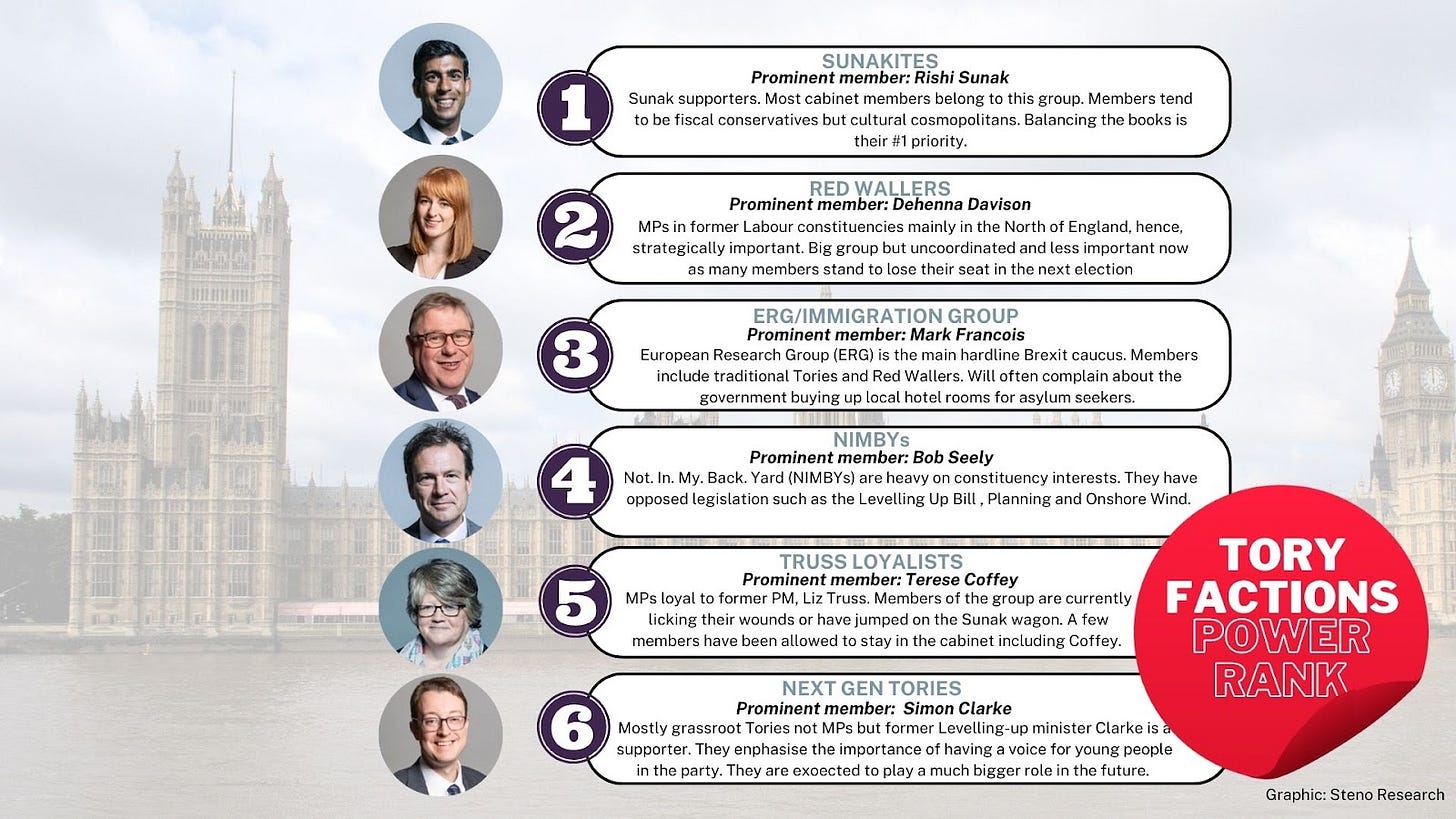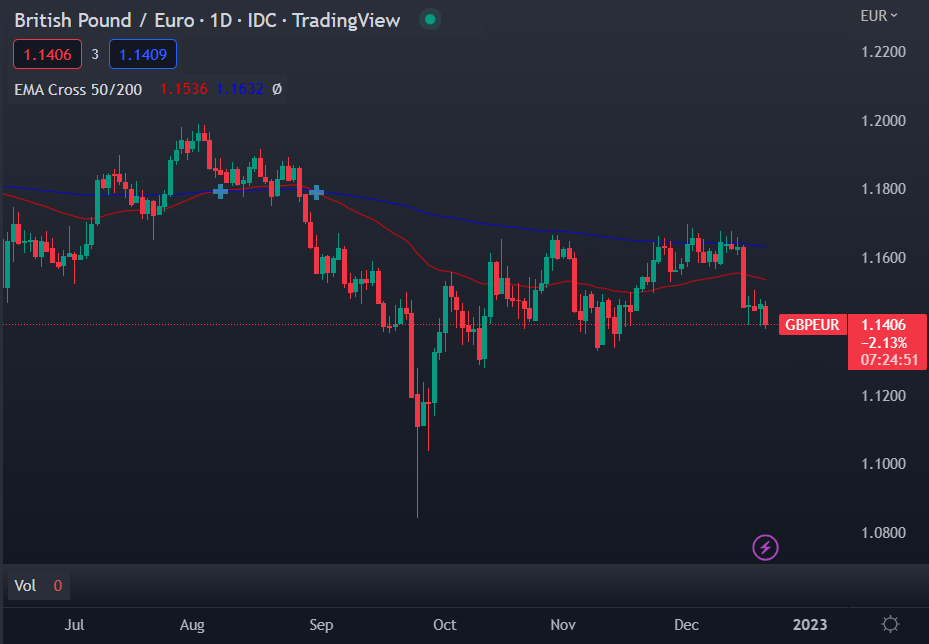Europolitics watch #2: The Tory Tragedy isn’t about division - it’s about defeatism
12 years of civil war in the Conservative party has trapped Rishi Sunak in a doom-loop between economic crisis and a defeatist Tory MP group. Will the 2024 general election clear the path for reform?

Rishi Sunak was baptized by fire. Since being elected as the MP for Yorkshire in 2015, he has climbed up the ranks of the Conservative Party at record speed. Serving as Chancellor in Prime Minister, Boris Johnson’s government, he was forced to renounce his Brexit comrade when Johnson stepped down in the wake of ‘party-gate’ in July; a scandal for which Sunak himself was fined by the police. At that point, association with Johnson had become a liability to anyone with Downing-street ambitions – a category that Sunak certainly fitted into. Unfortunately, so did Johnson’s foreign secretary, Liz Truss. New PM, Truss was sworn in by her majesty Queen Elizabeth II at Balmoral on September 6th - an event so harrowing that Britain’s longest reigning monarch called it quits not 3 days after. Jokes aside, one can speculate if Lizzie had anticipated the havoc that her namesake sister would unleash. Truss not-so-‘mini-budget’ caused a run on the pound and a guilt market in freefall. Truss lost the confidence of her MP group and Sunak was vindicated – set to be the new king of the ashes.
#1 Battlefront: The Economic Crisis
From his predecessors, The current prime minister of the UK, Rishi Sunak inherited a war with two fronts: the cost-of-living-crisis and the loyalty crisis within the Conservative Party. In the first installment of our two-part series on the UK, we focused on the country’s economic situation: unprecedented increases in living costs have brought Brexit back into the conversation and working-class Brits to their knees.
Winter is coming
Things are hardly looking better as we are approaching the height of winter: UK households are fighting a >25% increase in electricity and gas component of the CPI (y/y), and prices are still expected to rise. Meanwhile, the UK has the oldest housing stock in comparison to EU Member States. The lack of incentive for landlords to renovate properties has had consequences, especially for home insulation: a Tado study, found that UK homes lose heat up to three times faster than in Germany. The controversial “Police, Crime, Sentencing and Courts Bill” which prompted violent ‘Kill the Bill’ protests across the UK in 2020, was widely adopted in response to the activist group, Insulate Britain’s sit down protests on London highways. .
I will return to why housing is such a potent political issue later in the article.
#2 Battlefront: The Conservative Party in crisis
If you ask the British public, the verdict is clear: the cost-of-living crisis is a distant first on the list of the most important political issues. Normally, when the political demand-side is that ‘one-note’, you’d expect a big catch-all party – especially one, who has built its brand on fiscal responsibility - to jump at the chance to play strong-man, crisis mitigator. Yet, the Tory inflation program has been wholly lacking. The Conservative Party has a 26-majority lead in the House of Commons yet judging by Tories’ confidence in their ability to make political change, you might as well be talking to the SNP representative from West Dunbartonshire. What brought about this crisis of morale in the Tory Party, and what does it mean for Sunak’s premiership? That is the focus of this article.
When winning gets boring, you add a little spice of your own.
Majoritarian systems commonly produce large parties with significant internal differences. Even so, 12 years of Tory government has made the UK a unique case. In the absence of any real opposition for years, Conservative MPs have focused their efforts on bettering their position in relation to each other. The 2016 Brexit referendum was the first major line of conflict which pitted the powerful European Research Group (ERG) caucus against centrists including then PM, David Cameron and current chancellor, Jeremy Hunt. Read our latest Europolitics Watch, to find out how this rivalry still affects politics today.
Cameron’s successor, Teressa May, was the first victim in what is now a tedious pattern of UK prime ministers ousted by their own backbenchers, when her Brexit deal met a downright revolt from the ERG. Next on the chopping board was Boris Johnson…. then came Truss. Today, the loyalties of Tory MPs are scattered across Johnson, Truss and Sunak – aside from a plethora of ideological camps.The rapid turnover of Tory leaders has left a legacy of former minister kicking their heels on the back benches and emboldened a growing number of “serial rebels”: Tory MPs who have built their brand on going against the party line. Just take a look at how MP, David Davis, proudly announced his new award for ‘most rebellious MP’ on his website. The enthusiasm of Tory rebels has hardly been dampened since Sunak took over as PM. He will have to fight hard to stop them.
The Loser Mentality
But in reality, inter-party rivalries aren’t the issue it used to be. In fact, Sunak might wish they played a bigger role if only it meant that MPs cared enough about their job to give attention to those kinds of squabbles. No Sunak faces a far greater challenge from Tory benches: NO ONE CARES. Considering the current polls, it's quite difficult to find a Conservative MP who is optimistic about the Tories' chances of winning the next election. I think Sunak is starting to realize that defeatism can be just as politically paralyzing than inter-party rivalries. The prospect of defeat has led some Tories to consider if they would want to return in opposition, even if they think they will hold their seat. In the past few weeks, the party has seen a resignation epidemic. So far, 14 out of 357 Conservative MPs have said they won't stand in the next election. Many of these MPs are young talents, including Chloe Smith, 40; William Wragg and 34, Dehenna Davison, 29, who is leaving because of negative experiences and “abuse” from the public. Sir Charles Walker, who is stepping down, said the political environment had become "toxic".
The NIMBY wave
Striking a balance between party and constituency interests has always been a delicate matter for British MPs. However, the widespread acknowledgement that the Tories will lose the next general election has tipped the scales overwhelmingly in favor of constituency interests. Some Tories have given up completely and provide little resistance to Sunak. These include many “Red Wall Tories”, a group who previously held substantial leverage due to their strategically important constituencies. Now they have resolved to “picking their battles” in the recognition that no one - not even Sunak - believe they stand a chance. Other MPs have decided that they aren’t leaving without a fight, providing a far bigger headache for Sunak. They hope that they might be able to cling onto their seats at the next election if they bolster their credentials as constituency MPs rather than Tory MPs. Housing is the most potent political example of how this is playing out.
The Housing Divide
The ridiculous number of local interests that MPs champion now, is the reason why the divides within the Conservative Party have become so multifaceted and tedious. One conflict that hasn’t gotten much attention in the media, yet sources close to Whitehall say is going to be defining for the Tories in the next 2-5 years, is the generational divide. Among some MPs, including former Levelling-up secretary, Simon Clarke, there is a growing concern that the party will gradually erode, if it doesn’t get more traction among young voters. Particularly, home ownership, which has become virtually unobtainable for people under 30 – has fueled a perception that Tories only represent the interests of rich pensioners in the South. Sunak’s high profile National Planning Policy Framework promised to deliver 300.000 new homes yearly. Unfortunately for him, Southern NIMBYs weren’t thrilled by the prospect of an army of frat houses ruining the ambiance at Sunday morning brunch. Sunak was forced to swallow several amendments to get the MPs in question on board the bill including allowing local councils to decide for themselves how many new homes they want to build. Housing interests groups have called the move ‘a complete capitulation’.
The Sunak Doom Loop
The Planning Reform is symptomatic of the Sunak premiership. Sunak was elected on the ‘Biden-mandate’: being the least controversial candidate whose only real job was not to make matters worse. He has managed to stabilize the MP group by staying away from “far-reaching” proposals of any kind, but this strategy has done little to improve living conditions in the UK. As a result, Tories, today, poll almost as badly as they did during the Trussastrophy. The downside of this strategy is that as long as the Tories’ election prospects remain gloomy there is little reason for MPs to prioritize the party over their narrow constituency interests. Sunak is trapped in a doom loop between stabilizing the party and stabilizing the country. Right now it seems like the country is getting the shorter end of that trade-off.
Does that mean that Sunak has given up completely? Of course not. Our sources report that the tone in parliament is actually more jovial than it has been for a while: Tory MPs simply don’t care enough to stand in the way of Sunak’s lame-duck bills. They are biding their time waiting for something bigger. Right now, Sunak’s main problem is that he hasn’t defined his premiership - the problem - the bill - that will frame his time as PM and his bid for re-election in 2024. Keep an extra keen eye on the Spring Budget in March for a big speech. Unfortunately for Sunak, several Tory MPs are also awaiting this opportunity to strike an important blow to his continued leadership.
2024 election prospects
Labour is looking strong ahead of the 2024 general election. Labour leader, Keir Starmer is smart: Downplaying income tax and focusing most of his attention on windfall taxes and targeting the tax havens of the wealthiest 1% of Britons. Evidently, he hopes that the upper-middle class will hand him the key to Downing street, and they probably will.
However, here are a few reasons to believe that Labour won’t get the landslide victory that polls are currently predicting: Firstly, a series of major changes to UK elections including voter ID requirements and an imminent revamp of Commons constituencies is expected to work to Tory advantage. Secondly, can Labour get out the vote? For a growing number of Britons, a Tory PM is all they’ve known. In a time with so many uncertainties, I suspect that many swing voters will default to the familiar Tory party, or stay at home. Early signs indicate that this might indeed be the case: Voter turnout fell by almost 44 percentage points in the Stretford and Urmston constituency bi-election on 15 December 2022. A high voter turnout will be essential if Labour wants to avoid a hung parliament and clear the path for far-reaching reforms after the 2024 election.
What should the investor do?
The good advice for the macro investor is to keep a close eye on the development of Labour’s election promises. The Left wing of the party will push for a radical agenda, emboldened by their comfortable lead in the polls and rising dissatisfaction with the cost-of-living crisis among British workers. A spend-heavy or regulation-heavy agenda could cause fear and disturbances in both equities and FX during 2023.









Speaking as a brit who splits his time between the UK and France. Don't underestimate the Tories, the silent majority speak with their ballet paper and when push comes to shove I'm just not sure Labour can garner the support of the populous. The political class in the UK are in a sorry state!